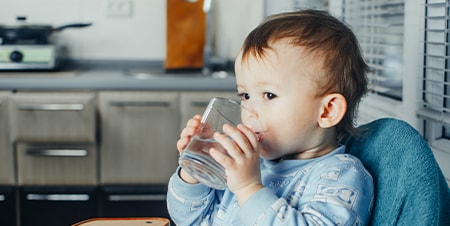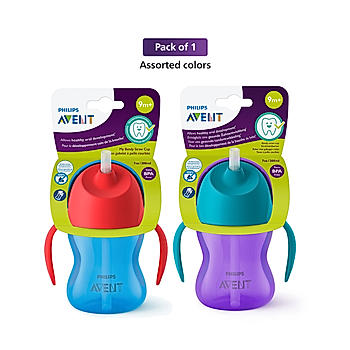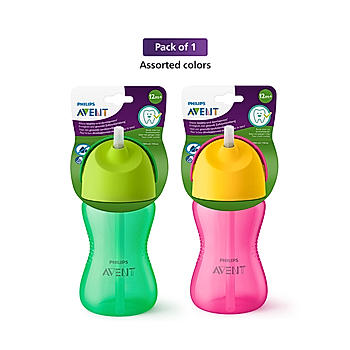The reason babies can’t drink water before starting solid foods is that breast milk provides all the hydration they need. There are also some risks associated with starting water too early. Read this article for more details

When Can My Baby Start Drinking Water?
By now you probably know about the important part breast milk plays in the first one year of a newborn’s life. But what might be unclear is when to start giving baby water. Even though, water is the most essential liquid on earth, babies do just fine without it – at least for the first six months.
Water should only be given to baby when they start solid foods. All the hydration they need before solid foods will come from breast milk. Giving baby water before this milestone could be detrimental to their health, as they may end up eating less – and losing weight. It also interferes with their growth as they won’t be getting the essential nutrients that they normally get from breast milk, since they will substitute it with water.
When can babies drink water?
When to introduce water to baby is an important topic of discussion that new mothers should be well-versed and knowledgeable about. Babies can only start drinking water when they start solid foods. This usually comes around the six-month mark. Before six months, breast milk is all a newborn baby needs to stay hydrated. However, once solid foods are started, you can serve water in small portions. Make sure to first boil the water, then let it cool down, before giving it to baby.
The reason babies can’t drink water before starting solid foods is that breast milk provides all the hydration they need. There are also some risks associated with starting water too early. These are
- Decreased milk supply – If you give your baby water, they will end up feeding less, and this will reduce the amount of milk produced in the breasts. Increasing milk supply after this would prove to be an ordeal so therefore it is best if it can be avoided by not giving the baby water when it isn’t required.
- Chemical imbalances – Water intoxication might sound absurd, but it’s a real thing. It occurs when electrolytes like sodium get diluted in the baby’s bloodstream. This can severely impact baby, resulting in lower body temperature and potentially seizures. In order to maintain a chemical balance, don’t let your baby drink water unnecessarily.
Because of these reasons, it is best to not give your baby any water before they start solid foods. Once they start solid foods, a little bit of water will help them avoid constipation as their bodies get used to digesting new substances.
If it’s hot and you are afraid baby might be dehydrated, just drink more water yourself, and this will automatically show up in the breast milk your baby will drink, keeping them nourished and healthy.
Look out for signs of dehydration in your baby such as fussiness, lesser diapers than usual, cracked lips, dark yellow urine, cold hands and feet, and irregular sleepiness. If these occur, increase the frequency of your feeds so that baby can get rehydrated.
How much water can my baby drink?
Now that we have covered when to give baby water, it is time to talk about the quantity of water that can be served to babies. Once baby starts eating solid foods, a little sip of water here and there can accompany the eating experience. This helps them digest the food better and avoid constipation.
Ideally, you can start baby off with 150ml of water (half a cup) a day. This is enough water for baby, as long as they are still breastfeeding.
Once your child is 12 months of age, you can slowly start giving them more water. This is also the age they will start eating more solid foods and less breast milk. You may have established a regular eating routine, and baby will need at least 250 ml of water a day to maintain hydration and proper bowel movements.
A child between the ages of 1 and 3 needs around 1.3 liters of water a day (including 350 ml of milk). The best way to check if baby is getting enough water is to check urine. Healthy urine should be colorless or light-colored, not dark. In order to maintain the amount of water consumed, keep a bottle of water close to your toddler so they can access it whenever they feel thirsty. Otherwise, they might forget while playing.
Benefits of giving your baby water
Drinking water has the same benefits for us as it does for babies. A few of these benefits are listed down below
- Transports nutrients and oxygen to cells – Water enters the blood and helps transport nutrients and oxygen to cells in the body, while carrying away any waste that may be left over.
- Maintains blood volume – In order to maintain blood volume, kidneys regulate the amount of sodium and water present in urine. By drinking water, it is easier for kidneys to filter out waste and extra fluids from the body.
- Keeps tissues and joints lubricated – The synovial fluid that keeps joints lubricated is made up of water. This fluid reduces the friction between joints, which is especially important to do in a delicate, growing baby.
- Eliminates need for any other liquid – Your baby will not need fruit juice until one year of age. Even then, limit fruit juice to small amounts as it adds extra calories, and leads to tooth decay and diarrhea.
- Helps relieve constipation – Once babies start on solid foods; their digestive systems will need some help in processing the bulkier poop that is going to be made. Water acts efficiently by rehydrating the colon, and making sure stool is soft and easy to pass.
- Aids in digestion – Digestion starts with saliva, which is essentially water. Enzymes found in saliva help break down food, and proper digestion makes minerals and nutrients more accessible to the body. It also helps with digesting soluble fiber. Fiber dissolves easier when lubricated with water, making soft stools that pass easier.
- Helps remove waste – The kidneys, liver, and intestines use water to excrete waste efficiently. This happens in the form of perspiration, defecation, and urination. Water acts as a solvent, by flushing out toxins, while organs retain essential nutrients and electrolytes. Dehydration can result in hard and lumpy stools, in addition to constipation. Therefore, it is essential to stay hydrated.
When to give gripe water to breastfed baby
Your baby might experience stomach discomfort from time to time. This might lead to colic, as baby will cry due to the gassiness in their tummy. Gripe water is an herbal remedy and consists of water mixed with herbs that aid in digestion such as fennel, ginger, chamomile, and cinnamon. Gripe water also helps with teething pains and hiccups. Teething pains cause baby to swallow excess air which in turn lead to Hiccups result when the diaphragm is irritated due to indigestion, flatulence, or acid reflux, and spasms, causing the hiccupping sound. Gripe water soothes the diaphragm and provides relief from hiccups.
Several manufacturers may claim that gripe water can be given as early as two weeks. However, it is better to stay safe and wait for at least a month, as the digestive tract of a baby is still sensitive and developing at that point. Better yet, consult your pediatrician before giving gripe water to your baby. Furthermore, always ensure that you buy gripe water made specifically for babies, as the ingredients vary from formula to formula.
Potential side effects of using gripe water
Before starting your baby on gripe water, you should know about the risks associated with it.
- It may cause an allergic reaction in your baby
- It may introduce bacteria into the digestive system
- If given soon, it might interfere with milk supply
Alternatives to gripe water
There are other ways to soothe baby if you do not want to give them gripe water. These are, but not limited to:
- White noise – It mimics the atmosphere of the womb.
- Swaddling the baby – Make them feel comfortable and protected.
- Rubbing baby’s belly in gentle, circular motions – This action, along with some gentle pressure, helps them release gas while also comforting them.
- Distracting the baby – Takes their mind off of the discomfort they are facing.
Please be aware that the information given in these articles is only intended as general advice and should in no way be taken as a substitute for professional medical advice. If you or your family or your child is suffering from symptoms or conditions which are severe or persistent or you need specific medical advice, please seek professional medical assistance. Philips AVENT cannot be held responsible for any damages that result from the use of the information provided on this website.



